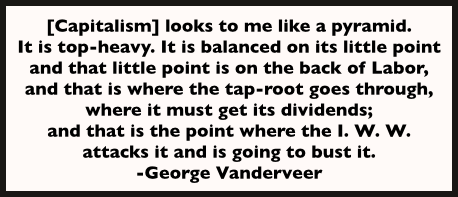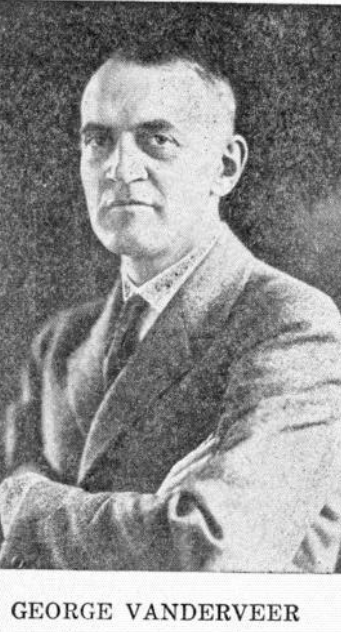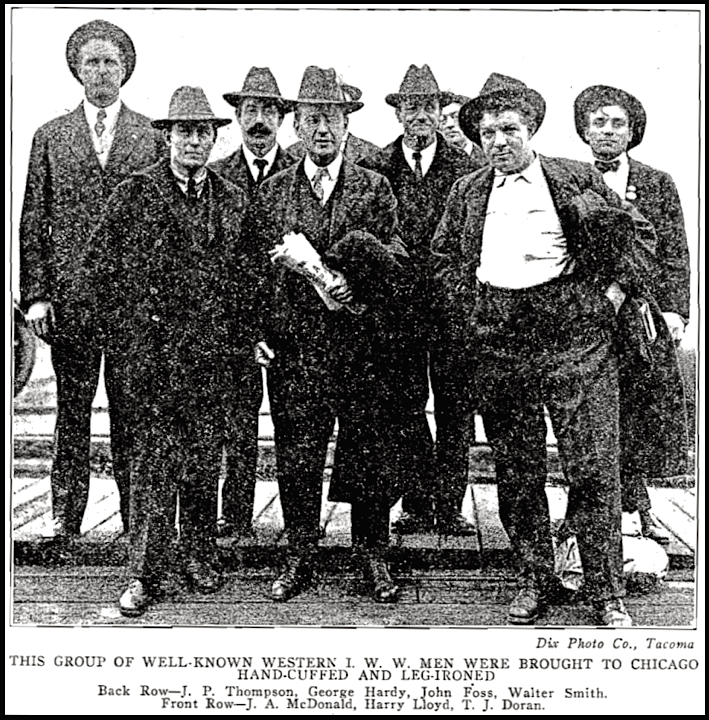
~~~~~~~~~~~~~~~~~~~~~~~~~~~~~~~~~~~~~~~~~~~~
Hellraisers Journal, Wednesday June 26, 1918
Chicago, Illinois – Landis Rules Against I. W. W.; Defense Opens
From The Daily Pantagraph (Bloomington, Ill.) of June 25, 1918:
HARD BLOW IS DEALT I. W. W.
—–
Judge Landis Declines to Admit Report
of Industrial Relations Committee.
—–(By Associated Press)
Chicago, June 24.-Federal Judge Landis dealt a hard blow to the defense in the I. W. W. trial today, counsel admitted, when he barred from evidence the eleven volume report of the federal industrial relations commission of which Frank P. Walsh was chairman.
On the commission’s report the I. W. W. based its entire course of dealing with the industrial situation, according to George F. Vanderveer, chief of counsel for the defense.
The attorney, in making his opening statement of the case of the defendants, who are charged with seditious conspiracy, denied that the I. W. W. organization had attempted to destroy the existing industrial system.
It was to lay the foundation of his case that the lawyer sought to submit in evidence the “I. W. W. Bible,” as published in 1915 [1916]. He declared the Walsh report was the “guiding light” of the I. W. W. members in all that they did.
Judge Landis refused to allow the defense to go into a general inquiry of industrial conditions.
Even Digest Is Barred.
The jury was out of the court room much of the time while the attorneys argued over the admissibility of evidence. The judge refused even to allow a digest of the Walsh report as prepared by James P. Thompson, one of the defendants to be introduced.
Attorney Vanderveer said that the indictment charges the defendants with conspiring to start strikes to obstruct the government’s war work. He declared it would be necessary to prove the intent of the defendants to interfere with production of copper, lumber and other supplies for government work.
Judge Landis said he had no idea of excluding evidence bearing on actions such as Mr. Vanderveer mentioned, but he made it clear that any broad industrial investigation would not be allowed as a part of this case.
———-
[Photograph added.]
—————
Vanderveer Opens for the Defense
Monday June 24, 1918, Part I
This case is unusual. It is supposed to be a case against William D. Haywood, James P. Thompson, John Foss, and a great number of other men whom you never heard of before, but-it is a charge of “conspiracy” wherein the prosecution claims these defendants have conspired to violate certain laws of the United States and for which alleged crime the prosecution here purposes to send these defendants to prison. Yet in reality, it is the purpose of the prosecution to destroy the organization with which these men are connected and to break the ideal for which their organization stands.
You are told that this case is of great importance to the nation; yet it involves more than the nation-it involves the whole social order. There are five counts in the indictment which recites numerous “overt acts” supposedly committed in furtherance of the “conspiracy;” one of these acts is the circulation of the Preamble of the I. W. W. Constitution; another an editorial in an issue of Solidarity entitled “We are Dissatisfied”-the latter plainly stating that “the present industrial system is useless and we mean to destroy it” It is the function of the defense to explain this to you. We want you to notice especially that the purpose of this organization is not to destroy government but to control industry-two things which ought to be separate.
It is manifestly impossible for me, gentlemen, within the limit of time allotted to me to attempt it-to tell you all that these hundred or more defendants have said or done, and all that they have had in their minds.
They classify themselves, however, into two classes. Some have had something to do with strikes-not unlawful as such-and which become unlawful only when accompanied by a certain sinister, unlawful purpose which is attributed to them in these various counts of the indictment.
Some of these men, again, have had no direct connection with any strike, but they have engaged during the period of supposed conspiracy in organizing men on various jobs-or have gone out as lecturers, or have carried the gospel of the organization in whatever manner to the workers.
I am not clear, in my own mind, upon what theory counsel seeks to hold here men who have had nothing to do with strikes, men who have had nothing to do with war activities. It may be counsel’s contention that their activities as members became unlawful by reason of the unlawful character of the organization. Again the question whether or not it is lawful or unlawful in its character must be determined by its purpose.
Now, in every issue of Solidarity, about which you have heard a great deal here-on the top of the front page you will find these words-“Education-Organization-Emancipation.” What do they mean? What do they mean standing alone or taken in connection with other things which you will find stated as part of the philosophy of the organization?
For instance, what do they mean in connection with the statement that the two classes in our society have nothing in common, the working class and the employing class?
I want to state to you what these men have said, what they have done, and what their intention has been in doing these things.
His Honor has struck out my reference to the Industrial Relations Commission Report. I do not want to repeat. You will remember-how the vast majority of our common laborers in the basic industries from which this organization recruits its membership, are unable to earn the barest living for themselves and their families. It has been the function of these men to tell these facts to the working people, in order that, understanding their conditions, and the causes of their conditions, they may more intelligently and efficiently go out and find and apply the remedy. It is a sad commentary on our system that 79 per cent. of the heads of our working class families are utterly unable to support their families and to educate their children on a plane of civic decency. Nobody can right the wrongs of the past. All we can do is to concern ourselves with the future and prevent, if possible, further development and growth of a system which brings these things about.
One hundred per cent. of railroad workers are employed by corporations; ninety per cent. of all workers in mines are employed by corporations; seventy-five per cent. of all workers in other industries are likewise employed by corporations. What is the purpose and method by which corporations, once organized, get together and blend themselves by a system of interlocking directorates or what not, into a large industrial unit known as a trust?
We have reared up in our midst here a tremendous industrial fabric. When we look at it sometimes and contemplate the figures which it represents, it is appalling. We wonder what we are going to do. The bigger the thing the more it must be fed, because you have got to feed it six per cent. or ten per cent. or twenty per cent. or twenty-five percent. a year, other wise it disintegrates of itself.
Another thing that is significant in connection with this development is the fact that trusts when formed, almost without exception, go under management of financiers rather than business men. That makes for social waste. How far has that gone? I want to mention this, and I want you to get what it means because of its great social importance. The largest trust which stand over them all is what is known as the Money Trust, comprised of three rings; one known as the Morgan group, which controls $22,245,000,000; the Baker or First National Bank group, which control $11,500,000,000; the third, the Stillman, or National City Bank group controls $11,000,000,000. This gigantic combine controls wealth to the equal of the total values of all property in the states west of the Mississippi, both north and south. This colossal power destroys initiative, pigeonholes inventions and stifles business credit. You know and I know and these boys know better than anybody in the world that it has corrupted absolutely every source of public information. You never get the truth unless by accident. We are going to prove that to you in this case; right out of the mouths of some of these fellows who are sitting here and don’t know how we are going to do it.
Finally, perhaps most important of all, you have reared here a thing which is more powerful than your government itself; a thing which is the government-the invisible government of your country; which every day determines how much you eat, how much you get for your work; what kind of schooling your children get and how much food; whether your babies have proper medical attention; another thing-it has absolutely destroyed business ethics-business morals. A few years ago when the Pure Food Law was being considered, Doctor Wiley was told “If you make us call things by their right names you will bankrupt every food industry in the country”
How do these things affect the workers and the future of the coming generations? How affect prostitution? We will prove to you how the present system gives a girl a chance; that four times as many babies in working class families die in infancy than in the families of the business and professional class. And to what end is all this? That a few, a mere handful, should grow richer than any Croesus; that they may have autos they haven’t time to count; that they may lavish luxuries upon their lap-dogs that your babies and mine may never hope to have; that they may give monkey dinners and dog weddings.
All of us agree this situation is not right. But counsel says, “Your way is the wrong way, you must use political action.” Now, I never saw a gambler but what wants to use his own cards and make his own rules. We have tried that game and Bull-Moosed a while. We have tinkered with the tariff. We have busted the trusts into little pieces. And how much have we accomplished? Why?
I have told you a while ago that we have reared up a thing here bigger than we are, but that thing looks to me like a pyramid. It is top-heavy. It is balanced on its little point and that little point is on the back of Labor, and that is where the tap-root goes through, where it must get its dividends; and that is the point where the I. W. W. attacks it and is going to bust it. The minute you take the milk bottle away from this thing, that minute it is going to look around for a living elsewhere. Why political action? This thing was not reared by law. It grew because some men by combining in trust and corporations within industry got power to exploit Labor. And it will quit growing just as soon as Labor organizes and gets the power to stop its being exploited. “But you use sabotage,” says counsel. Yet out of the thousands of lumber mills in Washington, he brings only two which had saws broken by something not proven and a few threshing machines out of hundreds testified about here by witnesses. We will bring witnesses-not the kind you have seen here, I hope-but reputable farmers, who have been dealing with the I. W. W. for years in the places best organized by it, who will tell you they never had better workers than the I. W. W….
[Photograph added.]
~~~~~~~~~~~~~~~~~~~~~~
SOURCES
The Daily Pantagraph
(Bloomington, Illinois)
-June 25, 1918
https://www.newspapers.com/image/69350880/
The I.W.W. Trial
-Story of the Greatest Trial in Labor’s History
-by one of the Defendants
-by Harrison George
—-with introduction by A. S. Embree.
IWW, 1919
https://catalog.hathitrust.org/Record/100663067
Vanderveer’s Opening Address
https://babel.hathitrust.org/cgi/pt?id=umn.31951d01368761a;view=2up;seq=62
Note: First ad I can find for this book:
Butte Daily Bulletin -page 3
-Mar 5, 1919
https://www.newspapers.com/image/176048912/
IMAGES
George Vanderveer, Chaplin Centralia, p76
https://www.iww.org/PDF/history/library/Chaplin/Centralia.pdf
Western IWW Men Brought to Chicago for Trial, ISR Jan 1918
https://archive.org/stream/ISR-volume18#page/n171/mode/1up
See also:
Tag: IWW Federal Trial Chicago 1918
https://weneverforget.org/tag/iww-federal-trial-chicago-1918/
Tag: Commission on Industrial Relations
https://weneverforget.org/tag/commission-on-industrial-relations/
Tag: George Vanderveer
https://weneverforget.org/tag/george-vanderveer/
Hellraisers Journal, Wednesday January 31, 1917
Washington, D. C. – Government Printing Office Publishes Reports
Note: all 11 volumes carry publishing date: 1916.
Published! 10,000 Copies of Eleven-Volume Sets of Testimony Submitted to Congress by Commission on Industrial Relations
~~~~~~~~~~~~~~~~~~~~~~~~~~~~~~~~~~~~~~~~~~~~
There is Power in a Union – Utah Phillips
Lyrics by Joe Hill


